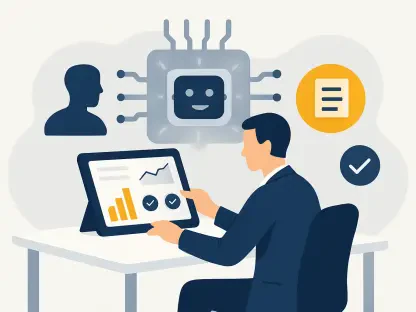Imagine a world where life-saving drugs are developed at unprecedented speed, where legal and compliance risks are identified before they become crises, and where ethical dilemmas in technology adoption are addressed with clarity and foresight. Artificial Intelligence (AI) is making this vision a reality within the pharmaceutical industry, reshaping everything from drug discovery to regulatory oversight. This transformative technology offers the promise of unparalleled efficiency, enabling companies to streamline complex processes and uncover insights that were once out of reach. However, with such power comes the responsibility to navigate ethical challenges and mitigate risks. As AI continues to integrate into critical areas like legal operations, compliance monitoring, and research and development (R&D), the industry stands at a pivotal moment. Balancing innovation with accountability is no longer optional but essential to ensure that advancements benefit society without compromising integrity or trust.
Revolutionizing Legal and Compliance Operations
The integration of AI into legal and compliance functions within the pharmaceutical sector marks a significant shift in how organizations manage their operations. Advanced tools powered by AI are already transforming contract management by automating the drafting and review of clauses, saving countless hours that were previously spent on manual tasks. Beyond contracts, these technologies enhance legal research by quickly sifting through vast databases to identify relevant precedents and regulations. In compliance, AI’s strength lies in its ability to analyze massive datasets, uncovering trends and risk patterns that human oversight might miss. This capability allows companies to address potential issues proactively, long before they escalate into costly problems. Law firms and corporate legal teams are increasingly leading the charge in adopting these solutions, recognizing the competitive edge that AI provides in a highly regulated environment. The result is a more agile and responsive framework that aligns with the fast-paced demands of the industry while maintaining rigorous standards.
Moreover, AI’s role in compliance extends beyond mere data analysis to fostering a culture of prevention. By identifying anomalies in financial transactions or employee behaviors, AI systems help organizations stay ahead of regulatory scrutiny and internal misconduct. This predictive power is particularly valuable in an industry where even minor lapses can lead to severe penalties or reputational damage. Additionally, AI tools are being tailored to monitor adherence to evolving global regulations, ensuring that pharmaceutical companies remain compliant across multiple jurisdictions. Such advancements reduce the burden on human resources, allowing compliance officers to focus on strategic decision-making rather than routine monitoring. The efficiency gained through these applications not only cuts operational costs but also builds a foundation of trust with stakeholders. As AI continues to evolve, its potential to refine these processes further promises to redefine how legal and compliance challenges are addressed in the pharmaceutical landscape.
Accelerating Drug Development with Precision
AI is proving to be a game-changer in the realm of drug development, offering solutions that accelerate every stage of the process from initial research to clinical trials. By leveraging machine learning algorithms, researchers can analyze biological data at a scale and speed previously unimaginable, identifying promising drug candidates in a fraction of the time. This technology also plays a crucial role in optimizing trial design, predicting patient outcomes, and personalizing treatment approaches based on genetic and environmental factors. Post-approval, AI supports safety monitoring by continuously analyzing real-world data to detect adverse effects early. Such capabilities not only shorten the timeline for bringing new therapies to market but also enhance the quality of outcomes for patients. The pharmaceutical industry benefits from reduced R&D costs while maintaining a sharp focus on innovation, positioning AI as a cornerstone of modern drug development strategies that prioritize both speed and precision.
In addition to speeding up discovery, AI contributes significantly to regulatory compliance during and after the drug development cycle. Automated systems can track and manage the vast documentation required for submissions to health authorities, ensuring accuracy and timeliness. These tools also assist in generating real-world evidence by aggregating and interpreting data from diverse sources, which is critical for post-market surveillance and ongoing approvals. This level of automation minimizes human error and allows teams to allocate their expertise to more complex challenges, such as interpreting nuanced clinical results. Furthermore, AI’s ability to simulate trial scenarios helps in anticipating regulatory hurdles, enabling companies to prepare robust responses in advance. As a result, the technology fosters a more seamless interaction between pharmaceutical entities and regulatory bodies, ultimately benefiting patients who rely on timely access to safe and effective treatments. The impact of AI in this domain underscores its potential to transform healthcare delivery on a global scale.
Balancing Innovation with Ethical Responsibility
While AI offers remarkable opportunities for the pharmaceutical industry, the ethical implications of its adoption cannot be overlooked. Establishing clear governance frameworks is paramount to ensure that the technology is used responsibly, with transparency, fairness, and accountability at the forefront. Key considerations include determining what is technologically feasible, legally permissible, and ethically appropriate in each application of AI. For instance, handling sensitive patient data demands stringent safeguards to protect privacy and prevent bias in algorithmic decision-making. Human oversight remains essential to validate AI outputs and ensure that automated systems align with organizational values. This cautious approach reflects a broader commitment to building trust among stakeholders, including patients, regulators, and healthcare providers, who must feel confident that AI-driven innovations prioritize societal good over unchecked technological advancement.
Beyond establishing principles, practical steps are necessary to embed ethics into AI deployment within pharma. Training programs focused on high-risk areas, such as data security, equip employees with the knowledge to navigate potential pitfalls. Additionally, using approved AI tools with built-in protections and reviewing vendor agreements for confidentiality clauses are critical measures to safeguard sensitive information. Legislative frameworks, such as the EU’s risk classification system for AI, provide a useful model for assessing and mitigating risks based on the technology’s intended use. These strategies ensure that innovation does not outpace accountability, creating a balanced environment where AI can thrive without compromising integrity. By embedding ethical considerations into every stage of AI integration, the pharmaceutical industry can harness the full potential of this technology while maintaining public trust and adhering to the highest standards of conduct in a highly scrutinized field.
Navigating Risks for Sustainable Progress
Risk mitigation stands as a cornerstone of AI adoption in the pharmaceutical sector, requiring proactive strategies to address the challenges posed by rapidly evolving technology. Clear policies must be established to guide the use of AI, particularly in areas involving sensitive data or high-stakes decisions. Targeted training on identifying and managing risks ensures that employees are well-prepared to handle potential issues, from data breaches to algorithmic errors. Moreover, partnering with vendors who prioritize security and compliance through robust contracts adds an additional layer of protection. These measures collectively create a safety net that allows companies to innovate confidently while minimizing exposure to legal or reputational harm. Drawing on global frameworks, such as risk classification systems, further helps in categorizing AI applications by their potential impact, enabling tailored responses that match the level of scrutiny required for each use case.
Looking back, the journey of integrating AI into the pharmaceutical industry revealed a landscape of both opportunity and caution, where every advancement demanded a corresponding commitment to risk management. Reflecting on past efforts, the emphasis on approved tools and structured oversight proved instrumental in preventing misuse and ensuring compliance with evolving regulations. The focus on practical solutions, such as thorough vendor reviews and employee education, demonstrated that sustainable progress was achievable when risks were anticipated and addressed systematically. Moving forward, the industry must continue to refine these approaches, adapting to new challenges with agility and foresight. Strengthening collaborations between technologists, ethicists, and regulators will be vital to shaping a future where AI not only drives efficiency but also upholds the highest standards of responsibility. This balanced path forward promises to solidify AI’s role as a trusted ally in advancing healthcare for generations to come.









